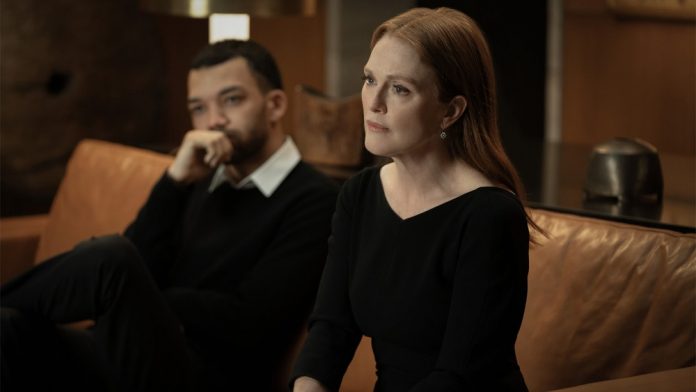For more than 15 years, Benjamin Caron has been directing a variety of television and theater productions, which led to him directing multiple episodes of the popular Netflix series The Crown as well as the Rogue One spinoff series Andor for Disney+.
Caron is finally having a moment in the feature world with Sharper, a twist-filled dramatic thriller starring Oscar winner Julianne Moore, Sebastian Stan, Justice Smith, Briana Middleton, and John Lithgow. Written by Alessandro Tanaka and Brian Gatewood, the screenplay had been on the Black List for a number of years before Moore came aboard and the project eventually found its way to Caron.
Sharper begins in a downtown New York bookshop where Tom (Smith) first encounters Sandra (Middleton). The two of them connect and go on a date, but it’s not exactly love at first sight, as we soon jump back in time to when Sandra met Max (Stan), a con man looking for his next swindle. It turns out that Max’s mother, Madeline (Moore), is married to a wealthy politician (Lithgow), and she isn’t particularly happy with Max’s lifestyle choices.
Of course, there’s more than meets the eye to this movie, which unfolds in a non-linear way as its narrative jumps back and forth in time revealing a little bit more about each character. Fortunately, there are enough twists and turns within Caron’s debut feature to keep even the most eagle-eyed viewers on their toes.
Above the Line recently spoke with Caron over Zoom about how quickly Sharper came together and what a fantastic experience he had while directing his first feature.
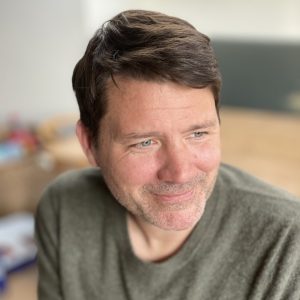
Above the Line: I want to be careful about spoilers, though it’ll be tough. I feel like not knowing much about Sharper going in helped with my own enjoyment.
Benjamin Caron: Tell everyone that, as much as you possibly can, please, because genuinely, I think that experience is true. It’s surprising… the less you know, the better.
ATL: You’ve obviously been directing theater and television for quite some time, and doing quite well in both mediums. Had you been looking for a feature film to direct for a while? How did this project land in your lap and what made you think, “This is the one”?
Caron: [I’ve wanted to direct] since I was 18 years old. I remember watching Harold and Maude. I was in Cincinnati, Ohio. I had taken a year off and gone traveling, and I was at a friend of my father’s house. I was talking about how much I love film, and he said, ‘Have you seen Harold and Maude?’ He put it on, and in that moment, I was like, ‘Wow, this film is extraordinary.’ I suddenly started wondering about the person who had made the film, and I went on this [deep] dive into who Hal Ashby was. I guess that was the first moment I was like, “I’m interested in being a filmmaker or film director,” and what that was.
I can look back now and understand that was the beginning of it, but then you can’t just go, “I’m going to be a film director.” There are those stories of film directors that you hear about that are 24-25 years old, like Spielberg, and you think, “If I haven’t made a movie by that age, it’s all over.” So you sort of have that on your shoulders. There was always the hope and the expectation that I would make a movie, but at that time, it was really hard to get into films. I had to prove myself in drama and work my way through various different shows.
While working in television, the landscape changed, and Netflix came out, and the budgets and the actors and the writers all started moving across, and those two worlds started crossing over and I guess my expectations changed. I was then really happy working in high-end television for a few years, and the work I was doing with Peter Morgan and then Tony Gilroy, but it just got to a point like, “Okay, if I don’t make a movie now, it’s never gonna happen, so I’m gonna have to put my head above the parapet and find a story and a script that I feel compelled to make. And ultimately, go out there and put your head on the block.” Part of that was a bit of fear that goes with helming a feature film. You are basically putting yourself out there on the chopping block.
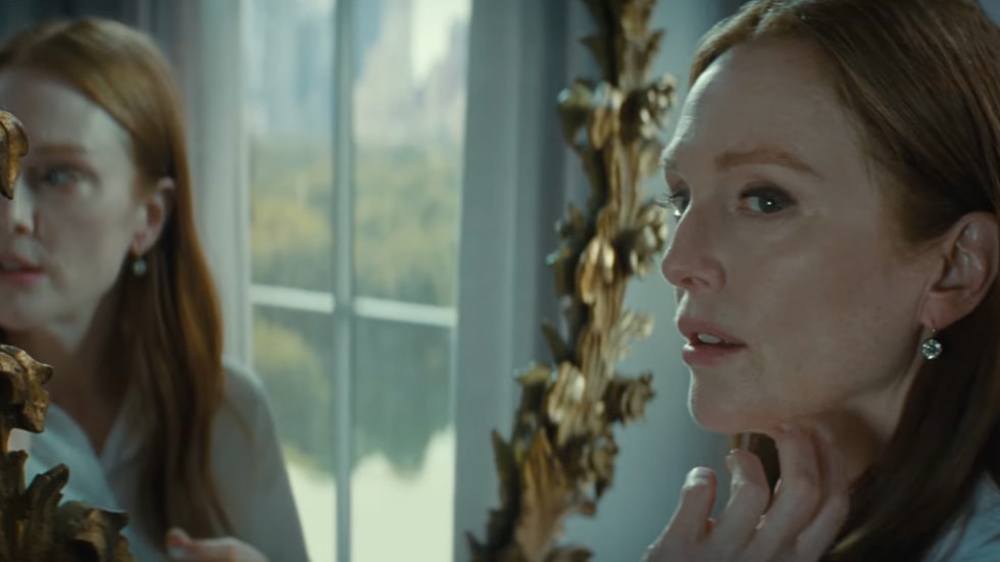
ATL: It’s interesting to hear your references from the ’70s because I feel like in the ’60s and ’70s, our impression of a director is some guy on set yelling at people through a megaphone, but nowadays, it’s much more of a team effort with all the heads of department and below-the-line crew.
Caron: Totally. A film is made by the many, not the few. I’m incredibly fortunate to work with so many brilliant collaborators. I think about myself as a filter, in many ways. You bring these amazing artists on, and you want their artistry to filter into the movie, and it’s my job to try and focus that into one vision.
ATL: I think I read that Julianne and her husband, Bart Freundlich, were attached as producers, and she was set to play Madeline even before you came on board. Did you have to audition for Julianne or pitch something to her to come on as director? I guess that’s a bit of a turnaround.
Caron: [laughs] That is a turnaround, and actually, in a roundabout way, that is true. It was the script written by Alex [Tanaka] and Brian [Gatewood], which is brilliant, but it was sitting there, unproduced. It was on the Black List for a couple of years. Julianne was looking for parts, and I think her team brought [her] the script, she read it, and straightaway called Alex and Brian and said, ‘I want to do this movie. Can we produce it together?’ And so they went out and found the financing, and Apple and A24, understandably, just jumped and were like, ‘we’ll come and finance this movie, we’ll distribute it.’ And then, it began the process of looking for a director.
I don’t know how many other directors [were approached] — I’ve been too terrified to ask them that question. I read the script. I inhaled it. I thought it was brilliant. I met them, I shared my vision for how I would approach this, [and] I guess we shared the same idea. It all happened pretty quickly. It was amazing. I don’t think it’s ever going to happen as quickly [as] this again in my life. I read the script. I met the producer, Erik Feig, I met Julianne Moore, I met Apple and A24, and they were like, ‘Okay, here’s the money. You’ve got the star. Here’s the script, and “go.”‘ It was like the stuff of dreams.
ATL: Was that all before COVID?
Caron: The process of meeting about the script was during COVID. I was shooting and finishing up on Andor, so that was sort of happening simultaneously, but the actual filming was at the back end. It was summer through [the] winter of 2021. There were no tourists in New York, which made it relatively straightforward, but there were still COVID restrictions on set.
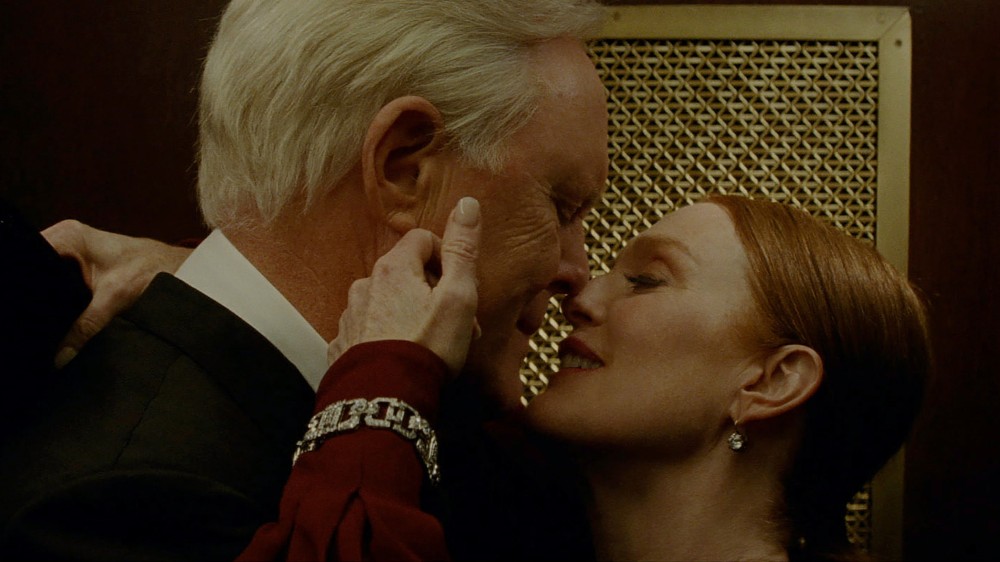
ATL: Did Julianne help out with the casting and throw out some ideas? I can’t remember if she’s actually worked with John Lithgow before.
Caron: I’m sure they’ve never been on screen before. I think they’ve been in a play together, but I’m not 100 percent sure about that. John Lithgow, I had worked with previously on The Crown, and we’d stayed in touch. Anytime I was in L.A., I used to just go meet up for a cup of tea and a piece of cake. I said to him, ‘I hope one day when I get to make a feature film, you’ll be part of that.’ Luckily, there was just the perfect role for him in Sharper. All of this is with Julianne’s blessing because ultimately, she’s a producer on the movie. She was incredibly generous and was like, ‘Look, you are the director of this film. This is your vision. I’m here to support you and make the film that you want to make.’ As a director, you always want to share ideas about casting.
When Sebastian came up, we were both like, ‘What a gift that we’ve got this amazing actor [who] is perfect.’ It’s difficult for me to talk about why he’s perfect for that role, but there’s a sort of duality to that role that you want him to play both kinds of characters. I think he is someone [who] could do that, and you would believe that he’s someone [who is] unpredictable. He’s someone that vibrates. I think those were just all the brilliant qualities that you wanted from Max.
And then Sandra, right from the very beginning, I thought this was an amazing opportunity to find someone who was at the very beginning of their career [who] we didn’t know about. [I knew] that if we had enough star power around her, we could have an exciting actor come in and play this role. We had the most amazing Casting Director, Laura Rosenthal, [and] when I saw Brianna, she just popped on screen and I knew straight away that was our Sandra.
ATL: She’s great with Justice, too. The two of them have great chemistry.
Caron: Those two, that relationship between Justice and Brianna is so, so important because you need to hold on to that love story throughout the whole film. Because, in a way, when you come around full circle at the end, that investment that you have put into [them], as a couple, you need to hold on to when you get to the end of the film. They just had natural chemistry on film. [It was] risky. Because of COVID, we had to do all the casting online. Typically, in that situation, you would bring those actors in together, just to make sure that they get on. There was a bit of risk in all of that, but I needn’t [have] worried, because they were just like, box office [i.e. money].
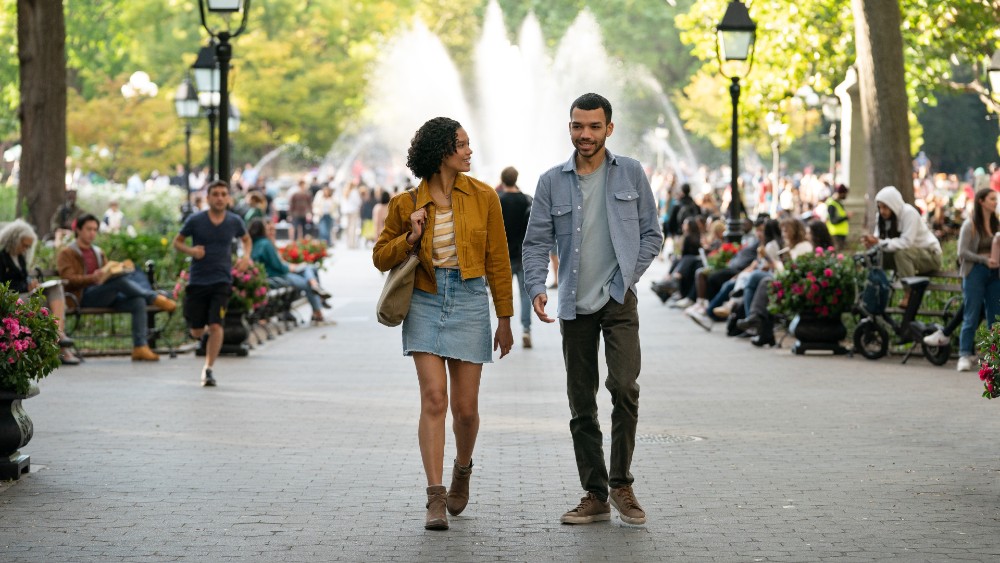
ATL: Did you shoot all of it in New York, including all the interior stuff, too?
Caron: Totally. The penthouse is a set because there was so much that took part there. I wanted to be able to control the lights, and it was incredibly tricky to do that in those genuine, uptown Manhattan penthouses. The brilliance of [Production Designer] Kevin Thompson [was], we discussed the look and feel, and we built that in a studio, [at] Silvercup in Queens. I think Sandra’s interior was also [a] set, but those were the only sets. Everything else was all on location in and around the boroughs of New York.
ATL: I definitely recognized the bookstore and the street it was on.
Caron: That’s Thompson Street. I literally stepped off the plane, I went to the production office, I met Kevin, and Samson [Jacobson], the Location Manager, and he was like, ‘Look, we just want to show you something that’s just come up,’ and that was the very first location I saw — that shop. It was empty, but I pitched this Notting Hill kind of idea of what I wanted the bookshop to be, and it just sort of fell into the indie version of that. It was completely empty, so obviously Kevin could go in and [fill] it out. We looked at some other bookshops around there for inspiration, but it just felt [like] the perfect setting to open the film.
ATL: I think either Kevin or his set decorators must have a good sense of humor because just behind Tom’s register, you can see copies of MadLibs, which may be an American thing, but it was funny to see that in an arty high-end bookshop in Soho.
Caron: I didn’t even know that, so there we go. That would be [Set Decorator] Rena [DeAngelo] or [Supervising Art Director] Debs [Jensen]. They work with Kevin and are brilliant, so there you go. That’s one of the great things about this film is that there are lots of things in there that if you go back and watch a second time, you’re gonna see little repeats of things, or costumes that crossover, or things our characters are doing that you may not spot the first time that have a slightly ulterior meaning.
ATL: One thing we can say without spoiling is that there is a nonlinear aspect to the film where we meet different characters at different times in their lives. As far as making a film like this, do you try to shoot somewhat chronologically, although obviously bearing in mind that there are a lot of locations the segments share, like the bookstore, etc.?
Caron: I guess the seasons were really important to me. In many ways, the shooting schedule was dictated by the time of the year. We kind of followed that, so we started [at] the end of the summer, and we went into fall and then finished it in the winter. Those were the first anchors that drove the shooting schedule. To your question about nonlinear narrative, I love that. It sort of echoed the twists and turns in the movie. It’s something that doesn’t declare itself. It’s something that at certain points, you find out, as you’re watching the movie and as it reveals itself, and you’re in it. It just works, and I don’t know how. It’s the brilliance of Alex and Brian; it shouldn’t work, but it does, even though it’s playing with timelines.
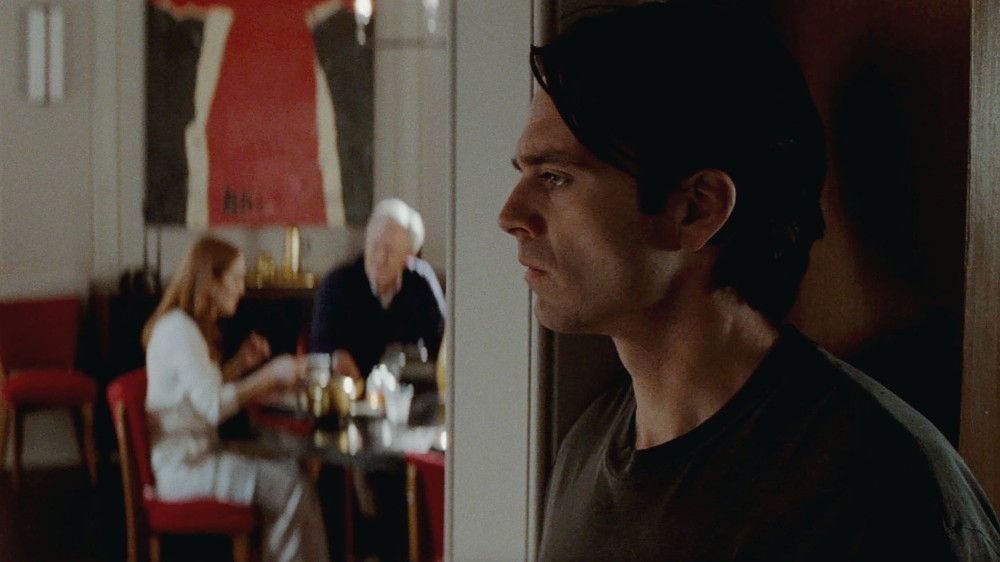
ATL: I’ve been a fan of Clint Mansell’s music for a long time. Had you worked with him on anything else before? How did his name come up to score Sharper?
Caron: I wish. He was on my “Okay, who’s my number one composer I’m going to court with? Clint.” There just really hadn’t been that opportunity, so when Sharper came along, I was like, ‘Okay, American movie, set in New York, near noir thriller, this is the time.’ I remember being blown away when I watched Pi and Requiem [for a Dream]; [they] changed the game in terms of how you can use score and film together. I called him and he loved the script, and we connected over a shared history, because we both grew up in a small town in the West Midlands in the UK, and his parents still go for Sunday lunch at my dad’s pub.
There was a weird past history, but we just connected about the type of music that would go with this. I love him, he’s brilliant. He’s very smart, actually, because when we were filming, he started to build the themes. He made sure that we were using those in the editing room when we started, because there’s nothing worse for a composer than you’re sort of playing around with someone else’s temp tracks, and they have to sort of come in. Right from the very beginning, he was giving us demos to put into the film.
ATL: Having directed your first feature — and you’re probably being asked this a lot — are you looking for the next movie or do you just go back to television since there’s so much work and opportunities there?
Caron: I mean, I would love to make another film again. I thoroughly enjoyed this whole experience from beginning to end. I’m developing a couple of projects with my sister, [who was] a co-producer on the movie, and a few of those are feature films, and then we have a couple of things [that] could be sort of television miniseries. I’m in a really happy place where, again, it’s the stories [and] the characters that are going to compel me and not necessarily exclusively [in] television or film.
ATL: I’m really excited for people to see this movie, and hopefully, I can talk to some of your collaborators sometime.
Caron: Absolutely. You should speak to Kevin, you should speak to Charlotte [Bruus Christensen, the Cinematographer], you should speak to Clint. They’re artists, all of them, and I think their great work shows in the film, so please do talk to them. By the way, thank you for guarding those secrets. Think about it as [if] you are guarding the greatest magic trick. People get that. People want that, I think, so thank you for doing that. I appreciate it.
SPOILER ALERT: When I mentioned to Caron that his film reminded me of The Grifters, he responded by telling me some of the films that influenced Sharper, so tread carefully if you don’t want to know anything at all!
Caron: I love that film [The Grifters]. That’s Stephen Frears. You know what? I didn’t watch that film for some reason. I had seen it many, many years ago, but that wasn’t one of the films I watched. I did go back and watch The Sting, and I did go back and watch The Color of Money, and I watched the early Thomas Crown Affair, and I watched Klute, which probably isn’t a film that you might think of in terms of a direct comparison to this, but it was something that I just loved. I remembered the love of how that looked and the feel and the tone and what Gordon Willis was doing with the light and the darkness in the frame and how they shot New York. I just loved the filmic naturalism, so that was probably the biggest reference point for me.”
Sharper will begin streaming on Apple TV+ on Friday, Feb. 17.


